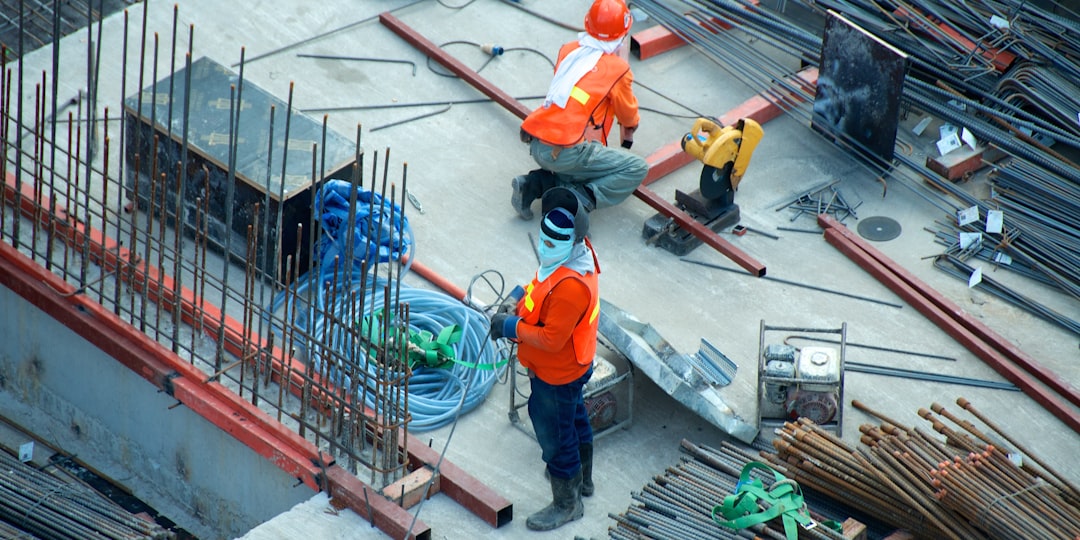

The Sustainable Development Goals (SDGs) are a set of 17 global goals adopted by the United Nations in 2015 as part of the 2030 Agenda for Sustainable Development. They serve as a universal call to action to end poverty, protect the planet, and ensure prosperity for all by addressing a range of interconnected social, economic, and environmental issues. The SDGs are relevant to various industries, including the construction sector. Here's why they are beneficial for the construction industry:

Guidance for Sustainable Practices: The SDGs provide a comprehensive framework that encourages businesses, including those in the construction industry, to adopt sustainable and responsible practices. These goals guide companies in aligning their operations with broader global objectives.
Social Responsibility: The SDGs emphasise social development, including goals related to poverty reduction, quality education, gender equality, and decent work and economic growth. By actively contributing to these goals, the construction industry can enhance its social responsibility and positive impact on communities.
Environmental Sustainability: Several SDGs are dedicated to environmental sustainability, including clean water and sanitation, affordable and clean energy, climate action, life below water, and life on land. The construction industry, with its significant environmental impact, can contribute by adopting eco-friendly practices, reducing waste, and mitigating climate change.
Infrastructure Development and Industry Innovation:The SDGs recognise the importance of sustainable infrastructure and industry innovation. The construction sector plays a key role in achieving these goals by incorporating innovative technologies, materials, and practices that enhance efficiency while minimising environmental impact.
Reduced Inequalities: Focuses on reducing inequalities within and among countries. The construction industry can contribute by promoting inclusive hiring practices, providing fair wages, and fostering diversity and equal opportunities for all.
Partnerships for the Goals: Emphasises the importance of partnerships to achieve the SDGs. Collaboration between governments, businesses, civil society, and other stakeholders is crucial. The construction industry can engage in partnerships to share knowledge, resources, and expertise to address sustainability challenges collectively.
Market Opportunities: Adopting sustainable practices aligned with the SDGs can open up new market opportunities for construction companies. Many clients, investors, and consumers are increasingly prioritising environmentally and socially responsible businesses, making sustainability a competitive advantage.
Risk Mitigation: Proactively addressing social and environmental issues through adherence to the SDGs can help construction companies mitigate risks associated with regulatory changes, reputational damage, and environmental liabilities.
In summary, the SDGs provide a holistic framework for the construction industry to contribute positively to global sustainable development. By integrating these goals into their business strategies and operations, construction companies can enhance their social and environmental impact while aligning with evolving societal expectations and market trends.

A Contractors Guide to: Social Values
Unlock the keys to socially responsible construction projects with the Social Values Guide based on Construction. Learn to engage communities, preserve culture, and promote sustainability for impactful, inclusive builds.
Claim Mine!Claim Mine!Frequently asked questions
Q: What are the 3 main aims of the Global Goals?
A: The Sustainable Development Goals (SDGs), also known as the Global Goals, were adopted by the United Nations in 2015 as a universal call to action to end poverty, protect the planet, and ensure that by 2030 all people enjoy peace and prosperity.
Q: What are the 5 P's of Global Goals?
A: The 17 SDGs are structured around the five pillars of the 2030 Agenda: People, Planet, Prosperity, Peace, and Partnerships. These 5 Ps highlight how the SDGs are an intertwined framework instead of a group of solo goals. The progress on one P must balance and support the progress on another.
Q: What are the Sustainable Development Goals (SDGs), and why are they important for the construction industry?
A: The SDGs are a set of 17 global goals adopted by the United Nations to address social, economic, and environmental challenges by 2030. They are crucial for the construction industry as they provide a framework for adopting sustainable practices, aligning business operations with global objectives, and enhancing social and environmental impact.
Q: How do the SDGs benefit construction companies?
A: The SDGs benefit construction companies by guiding them in:
- Adopting sustainable practices.
- Enhancing social responsibility.
- Contributing to environmental sustainability.
- Innovating in infrastructure development.
- Promoting inclusivity and reducing inequalities.
- Facilitating partnerships for collective sustainability efforts.
- Opening up new market opportunities.
- Mitigating risks associated with regulatory changes and reputational damage.
Q: How can construction companies contribute to achieving the SDGs?
A: Construction companies can contribute by:
- Adopting eco-friendly practices and materials.
- Supporting social development initiatives.
- Promoting environmental sustainability.
- Investing in sustainable infrastructure and innovation.
- Implementing inclusive hiring practices.
- Collaborating with stakeholders for collective impact.
- Capitalizing on market opportunities for sustainable projects.
- Proactively addressing social and environmental risks.
Q: What are some examples of SDG-aligned initiatives within the construction industry?
A: Examples include:
- Constructing green buildings certified by LEED or other standards.
- Integrating renewable energy solutions into construction projects.
- Investing in community development infrastructure.
- Implementing waste reduction and recycling programs.
Q: How can construction companies measure their progress towards SDG-related goals?
A: Construction companies can measure progress by:
- Setting measurable sustainability targets.
- Tracking resource consumption and waste generation.
- Conducting social impact assessments.
- Monitoring energy efficiency and carbon emissions.
- Engaging stakeholders for feedback and evaluation.
Q: What challenges might construction companies face in aligning with the SDGs?
A: Challenges may include:
- Initial investment costs in sustainable practices.
- Compliance with evolving regulations and standards.
- Ensuring sustainability across the supply chain.
- Meeting changing market demands for sustainability.
Q: How can construction companies communicate their commitment to the SDGs to stakeholders?
A: Construction companies can communicate commitment by:
- Developing sustainability reports.
- Engaging stakeholders in sustainability initiatives.
- Participating in industry events focused on sustainable development.
- Showcasing SDG-aligned projects and initiatives.
Q: Where can construction companies find additional support and guidance for integrating the SDGs?
A: Construction companies can find support from:
- Industry associations focused on sustainability.
- Sustainability consultants offering expertise.
- Government agencies providing resources and incentives.
This article has been provided for information purposes only. You should consult your own professional advisors for advice directly relating to your business or before taking action in relation to any of the provided content.
PS. Whenever you are ready, here's how to grow your construction business...
1. Join our Facebook Group which built completely for businesses within the construction industry. Real people, real support. - Now also available on LinkedIn.
2. Keep up to date with Construction Insider Providing you with industry insight, tips & tricks and much more to make sure you are ahead of your competitors!
3. When you are ready, Become a Saint Global client, and we will provide you with the highest quality solutions to effectively scale your construction business. Book your meeting here!

Written by the team at:












.jpg)



